Article 83: Margaret Thatcher – coffee and the UK economic recovery
Over the years the UK carried out major economic reforms and achieved a miraculous development, coffee has also replaced tea, becoming the drink of choice as the energy opening the way for the dream of the times.
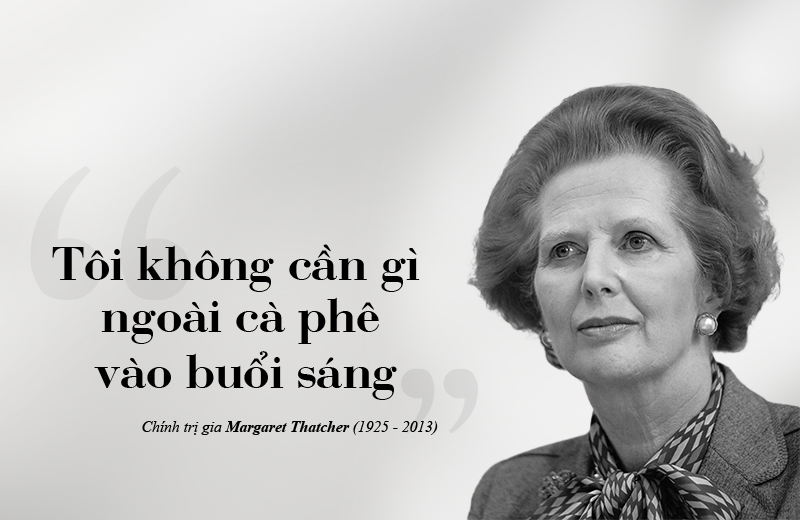
“I need nothing but coffee in the morning.” – Politician Margaret Thatcher (1925 – 2013)
Commitment with steadfast faith
In the early 1970s, the British economy was in deep turmoil with the collapse of manufacturing. The rate of inflation soared, the value of the pound plummeted, the unemployment rate soared, strikes were everywhere, especially after the oil crisis of 1973. In Spring of 1979, Margaret Thatcher – a woman from a small merchant family became Britain’s first female prime minister, this was a new turning point for the British political economy at that time.
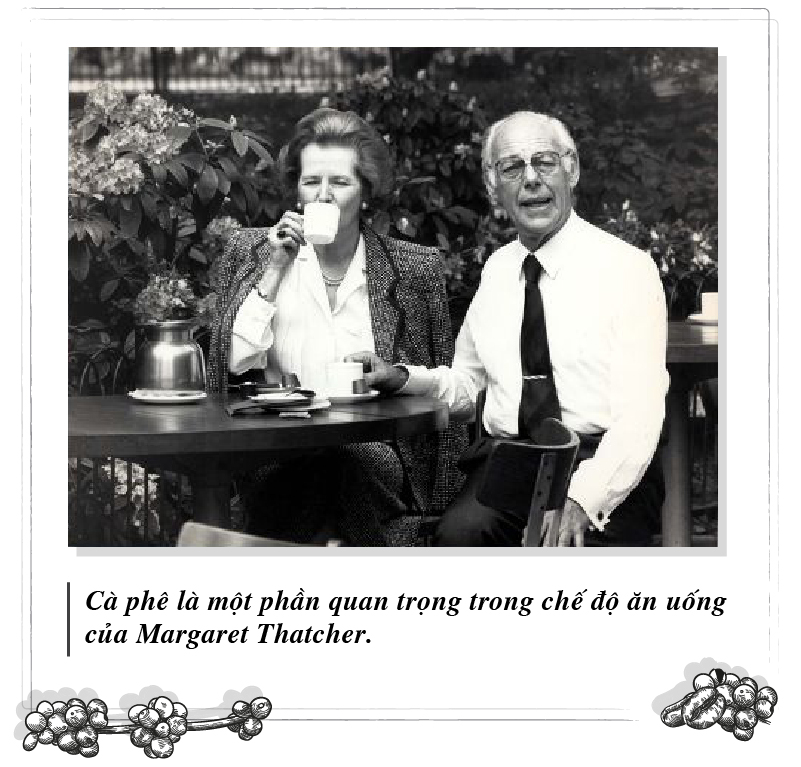
Coffee was an important part of Margaret Thatcher’s diet.
To save Britain’s dwindling fortunes, Mrs. Thatcher determined to launch economic reforms with policies collectively known as Thatcherism. She promoted the practice of the neo-liberal model, advocating economic freedom. Many nationalized industries were replaced by large-scale privatization. She also opposes the government’s excessive involvement in economic life and strict controls on public spending.
In the first years of implementation, monetary inflation was still high, the economy continued to decline, and society became increasingly chaotic. Thatcher came under intense attack from her opponents and 364 prominent economists. Thatcher did not give in, she continued to apply a series of tough policies in the fields of economy, diplomacy, defense, and internal affairs. Her unflinching warrior-like stance finally revived British business, fueling growth in British industry. Her policies were so influential that Thatcherism was listed in the Oxford dictionary as a popular principle in political circles in favor of the free market. This concept was also extended in popular culture and new economic policies.
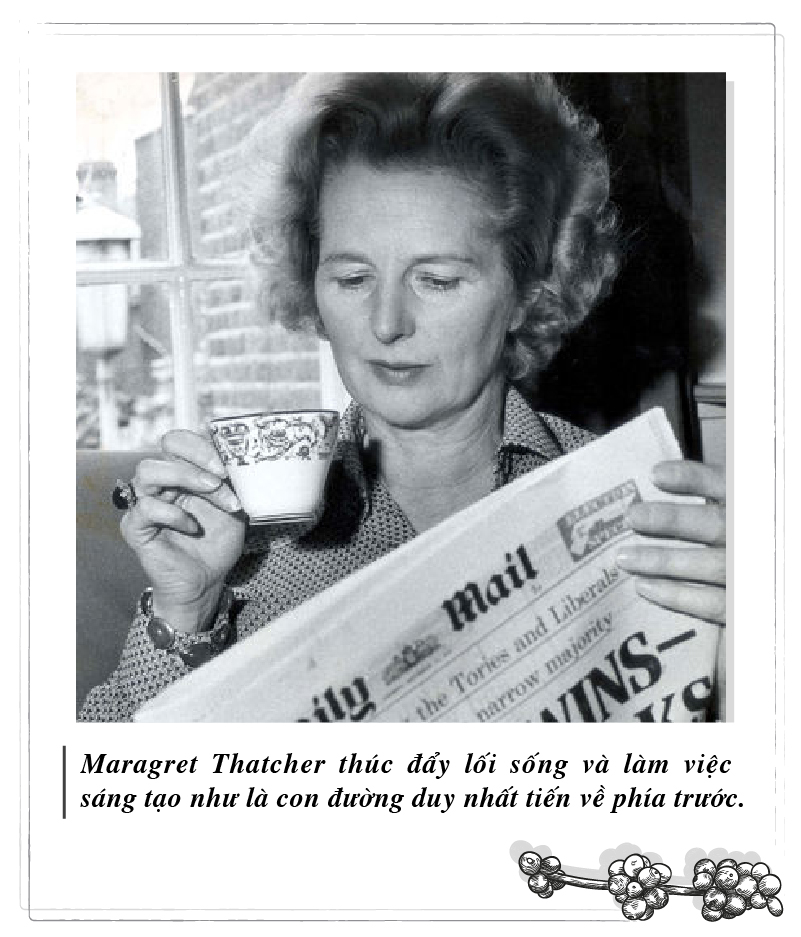
Margaret Thatcher promotes creative living and working as the only way forward.
One of the highlights of Margaret Thatcher’s time in office was how she indirectly promoted the UK’s creative industry. Throughout the 1980s, Margaret Thatcher and her government created successful media campaigns covering topics ranging from social life to major economic changes during mass privatization, aiming to revive England by the “corporate culture”. Margaret Thatcher continually encourages creativity as the only way forward.
In 1983, the Thatcher government introduced the Enterprise Allowance Scheme to support individual and small business startups. These campaigns not only brought political impact but also boosted the creative industry with the birth of many companies in the design, advertising, media, film and television industries, indirectly created the momentum for the development of the creative economy in the UK in the 20th century.
Coffee – The drink of the new era
Margaret Thatcher served as prime minister of the United Kingdom from 1979 to 1990, the longest-serving prime minister of the 20th century. To her supporters, Thatcher is the iconic nation’s heroine, who has ended Britain’s cycle of decline after World War II. Also, many criticized her as a tenacious destroyer of the UK’s socioeconomic structure. Whether in support or opposition, all acknowledge Margaret Thatcher as a courageous leader. Margaret Thatcher doesn’t care about political gain, she doesn’t care about praise and fame, she only cares about what’s best for the country. So, she has the courage to set ambitious goals and confidently pursue them to the end.
Margaret Thatcher is famous in the political world with the title “Iron Lady”. Margaret Thatcher always appears with an energetic image in public. She worked hard and tirelessly, sleeping only four hours a day. The Times called her “the warrior who turned up just in time.” Margaret Thatcher keeps her mind clear with her coffee habit. She starts her day with a cup of unsweetened coffee and some milk before heading to her office in the House of Commons. Margaret Thatcher loves to make coffee for herself and her family. Even when she appeared on television, she was making instant coffee in the kitchen.
Margaret Thatcher was also a coffee promoter, ushering in a rebirth of coffee shops in the UK. Since the 17th century, England was one of the first European countries to universalize coffee culture. During the Enlightenment, British cafes were so famous that they were called “Penny Universities”. However, much of the British colony was tea-growing countries. Because of the revenue derived from the tea trade, the Royal Family and the elite supported the promotion of tea consumption in lieu of coffee. By the mid-19th century, when tea drinking was formalized into the typical British afternoon tea culture, coffee was almost forgotten.
At the end of the 20th century, when Margaret Thatcher tried to increase the productivity of the British labor, she shortened the time for workers to drink tea. This means she is fighting the old system to establish a new one. Margaret Thatcher biographer Charles Moore described it as “the great struggle”. In the 1980s, tea consumption in the UK declined steadily. Meanwhile, the country’s coffee-drinking hobby is flourishing. In 1986, for the first time in history, coffee sales in the UK surpassed tea sales.
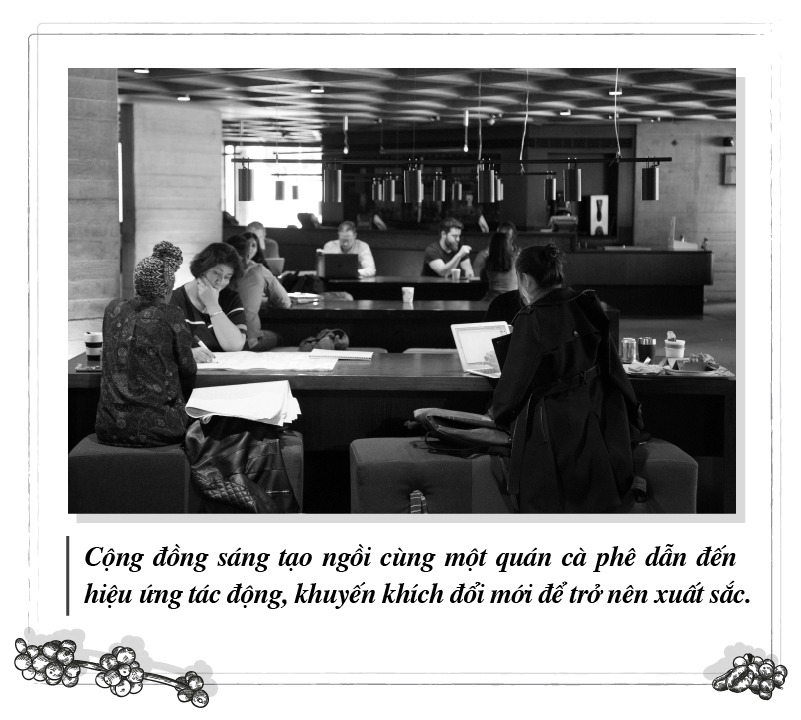
Creative communities sitting in the same cafe lead to impact effects, encouraging innovation for excellence.
British people who aspired to re-establish their status as a great power opted for a modern lifestyle. They see tea as a drink of “old England”, so coffee is chosen as the energy that contributes to the creation of a new age dream. Cafes have exploded across the UK and are often packed with people. Even “Flat White” – the name of a type of coffee – is also used to denote innovative businesses that thrive on the digital economy (Flat White Economy). Instead of working at the office or sitting at home, creative people often go to coffee shops to work. Communities of independent creators sitting in the same cafe form a kind of symbiotic relationship and lead to impact effects, encouraging innovation to excel. Economic thinker Douglas McWilliams sees the Flat White Economy ecosystem as the future of the British economy.
Margaret Thatcher is recognized as an influential political figure of the 20th century. She also produced dramatic effects in the arts and popular culture. Many literary works, commentaries, feature films, musical works, paintings… inspired by the life and career of Margaret Thatcher. “Iron Lady” is one of the famous films about the journey of Margaret Thatcher – from the daughter of a commoner family to the prime minister leading a world power.
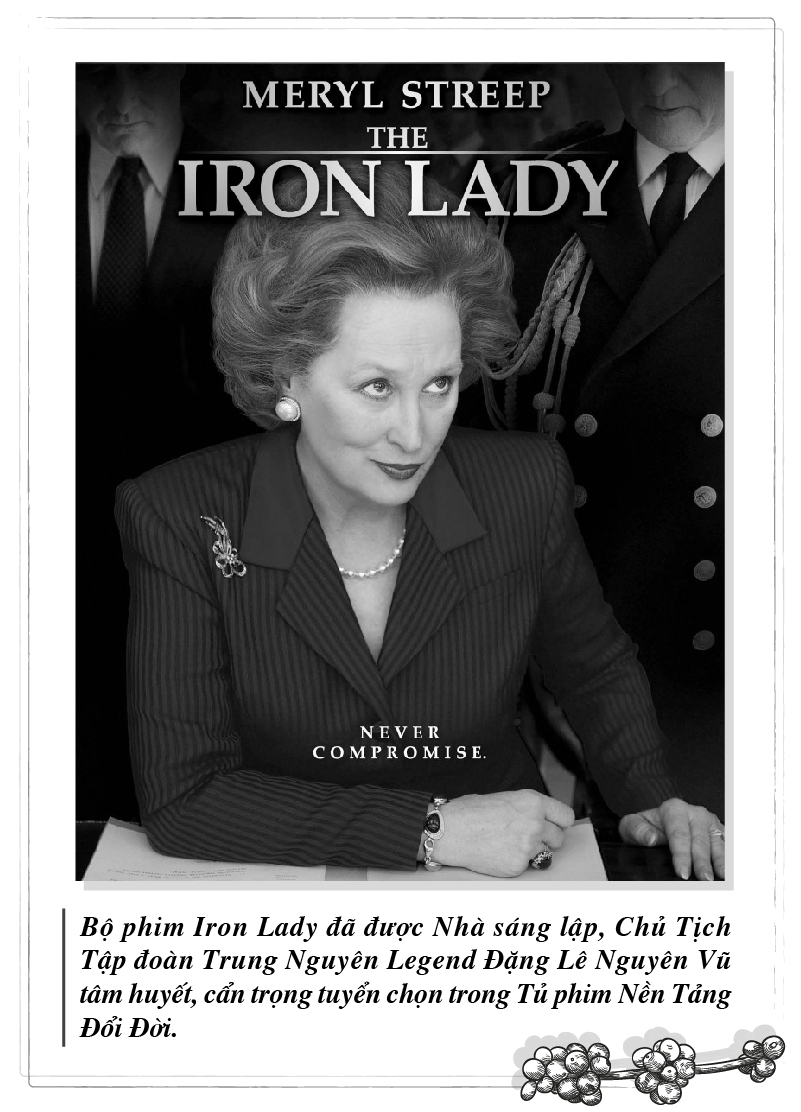
The movie Iron Lady has been carefully selected by the Founder and Chairman of Trung Nguyen Legend Group Dang Le Nguyen Vu in the Life Changing Foundational Film Cabinet.
Iron Lady is a true story of iron will, brave spirit that never backs down to decide her own destiny and change the destiny of the nation. Iron Lady is also one of the films carefully selected by the Founder and Chairman of Trung Nguyen Legend Group Dang Le Nguyen Vu in the Foundational Film Cabinet to convey valuable lessons of timeless values to the younger generation, thereby cultivating a warrior spirit, daring to commit to the great aspiration of building a powerful Vietnam.
THE REAL COFFEE
ROASTED ONLY FOR PEOPLE OF WISDOM!
Source: “The Philosophical Way of Coffee” – copyright by Trung Nguyen Legend
Coming up: The West and the establishment of a new coffee culture.


